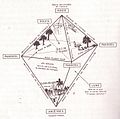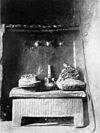Introduction The beliefs and practices of African people are highly diverse, and include various ethnic religions. Generally, these traditions are oral rather than scriptural and are passed down from one generation to another through narratives, songs, and festivals. They include beliefs in spirits and higher and lower gods, sometimes including a supreme being, as well as the veneration of the dead, use of magic, and traditional African medicine. Most religions can be described as animistic with various polytheistic and pantheistic aspects. The role of humanity is generally seen as one of harmonizing nature with the supernatural. (Full article...) Selected article'Haitian Vodou, known commonly as Voodoo is a syncretic religion practiced chiefly in Haiti and the Haitian diaspora. Practitioners are called "vodouists" Vodouists believe in a distant and unknowable Supreme Creator, Bondye (derived from the French term Bon Dieu, meaning "good God"). According to Vodouists, Bondye does not intercede in human affairs, and thus they direct their worship toward spirits subservient to Bondye, called loa. Every loa is responsible for a particular aspect of life, with the dynamic and changing personalities of each loa reflecting the many possibilities inherent to the aspects of life over which they preside. To navigate daily life, vodouists cultivate personal relationships with the loa through the presentation of offerings, the creation of personal altars and devotional objects, and participation in elaborate ceremonies of music, dance, and spirit possession. Vodou originated in what is now Benin and developed in the French colonial empire in the 18th century among West African peoples who were enslaved, when African religious practice was actively suppressed, and enslaved Africans were forced to convert to Christianity. Religious practices of contemporary Vodou are descended from, and closely related to, West African Vodun as practiced by the Fon and Ewe. Vodou also incorporates elements and symbolism from other African peoples including the Yoruba and Kongo; as well as Taíno religious beliefs, Roman Catholicism, and European spirituality including mysticism and other influences. Selected imagesFestivalsThere are several religious festivals found in the various Traditional African religions. Some of these are listed below next to their corresponding religion :
Selected biography
Akhenaten (/ˌækəˈnɑːtən/; also spelled Echnaton, and Khuenaten; meaning "Effective for Aten"), known before the fifth year of his reign as Amenhotep IV), was an ancient Egyptian pharaoh of the 18th Dynasty who ruled for 17 years and died perhaps in 1336 BC or 1334 BC. He is noted for abandoning traditional Egyptian polytheism and introducing worship centered on the Aten, which is sometimes described as monolatristic, henotheistic, or even quasi-monotheistic. An early inscription likens the Aten to the sun as compared to stars, and later official language avoids calling the Aten a god, giving the solar deity a status above mere gods.
Akhenaten tried to shift his culture from Egypt's traditional religion, but the shifts were not widely accepted. After his death, his monuments were dismantled and hidden, his statues were destroyed, and his name excluded from the king lists. Traditional religious practice was gradually restored, and when some dozen years later rulers without clear rights of succession from the 18th Dynasty founded a new dynasty, they discredited Akhenaten and his immediate successors, referring to Akhenaten himself as "the enemy" or "that criminal" in archival records. Selected quote
Roger S. Gottlieb Source: Gottlieb, Roger S., The Oxford Handbook of Religion and Ecology, Oxford University Press (2006), p. 261, ISBN 9780199727698 [1]
Did you know
Related portalsTopicsFor more Traditional African religion topics, see Category:Traditional African religions.
CategoriesWikiProjectsThings you can doAssociated WikimediaThe following Wikimedia Foundation sister projects provide more on this subject:
Discover Wikipedia using portals |






































